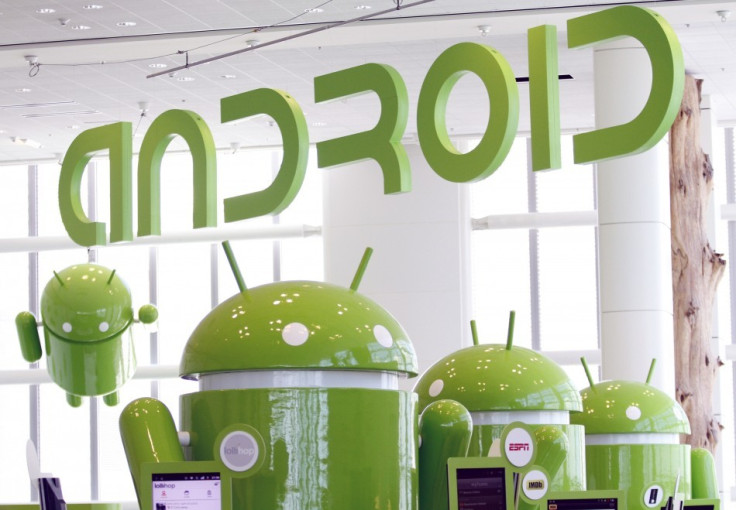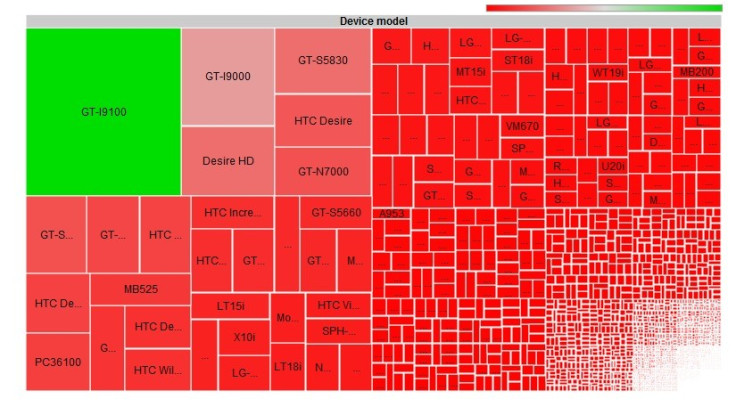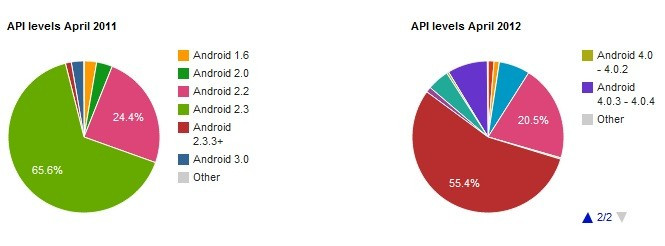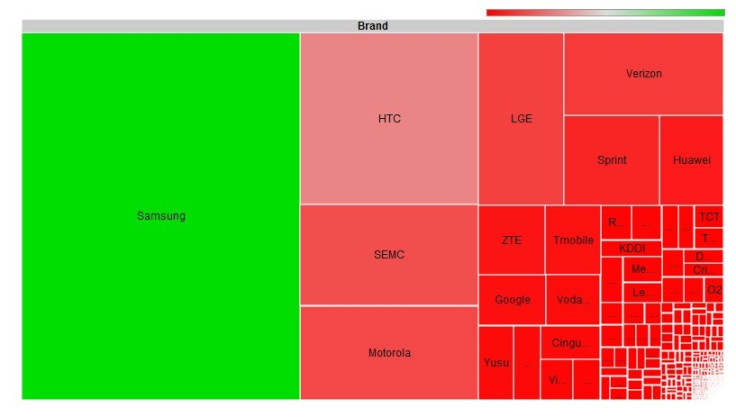Android Fragmentation: Good or Bad?
There are more Android-powered smartphones and tablets being activated every day than there are people being born. But is this proliferation of Android devices causing a problem, with nearly 4,000 different devices on the market?

Android has grown exponentially since launching in 2007, but the open source nature of the software - allowing smartphone manufacturers and even mobile networks to tweak how it looks and functions - has led to problems with updates and compatibility.
The scope of this fragmentation however has only recently come to light, with a new survey revealing that there are almost 4,000 different devices around the globe using the Android software.
The data comes from OpenSignalMaps , a group which is mainly concerned with creating a comprehensive database of mobile phone towers, signal strength and Wi-fi access points around the globe. The group does this through crowd-sourcing, getting members of the public to download an Android app which automatically uploads information regarding mobile phone towers and signals in your vicinity - as well as telling you how good (or not) your mobile broadnad connection is.
A by-product of this work meant that OpenSignalMaps has been able to ascertain just how many Android devices are out there, with the figure coming in at 3,997 unique devices. The most popular by some way was the Samsung Galaxy S2, with other devceis from Samsung as well as HTC among the more popular handsets. Samsung has the main manufacturer with 40 percent of the devices reported.
The issue of fragmentation has divided not only users but also developers and hardware manufacturers.
On the one hand, the proliferation of devices available thanks to Android's open nature means that there are a huge amount of smartphones and tablets to choose from, at various price points and either with or without the particular feature you are interested in.
On the flip side, the proliferation of devices and their associated screen sizes, varied internal hardware and custom ROMs (tweaks to the base Android software made by manufacturers and networks) mean that updates are slow and inconsistent, while apps developed for Android don't work properly on all phones or tablets.
But is fragmentation of Android a good or a bad thing? We decided to ask two developers to get their point of view.
Android Fragmentation: The Good

Manni Safa, product director at mobile marketing agency Somo, believes that fragmentation in Android poses a problem for him and his clients: "From our perspective, it makes it very difficult sometimes."
Compared to Android, developing apps for the iPad, iPhone and iPod touch is a lot more straightforward, Safa says:
"If someone comes in and says they want to build something for iOS, 99 percent of the time they know what screen resolution to build it at, what functionality we can tie into the hardware, and we can do some really exciting stuff."
However with Android the story is quite different and Safa often has to explain to his clients that to get an app to work on all Android devices, will mean a delay in publishing the app.
"With Android, we can turn around and tell our clients that the top used handset is the Samsung Galaxy S2. [But] unless we spend weeks, sometimes months, testing these applications we can guarantee on some of them [Android devices] it is going to look terrible."
It does cause hiccups quite often. Safa talks about one client where it took one month to build an iOS version of their app, and around the same time to build the Android version. But, by the time they had completed the QA testing for Android, it added weeks onto the build.

Somo has a base range of the top six Android handsets including the Galaxy S2, HTC One X, and the Galaxy Nexus for testing, but for some clients, such as those developing gambling and fashion apps, want the app to work across all Android phones, which adds a lot of time to the testing process.
Manni does believe that Google will have to change its approach in the future but does not see a quick fix which will solve all the issues. "It is a bit of a double -edged sword because a lot of the clients we talk to, like it [Android] because they can tweak it, they can change it."
On a technical level, the main problem of fragmentation is the inability to get things to work across the platform: "The biggest drawback for me [of fragmentation], as a animation director we are always trying to push the boundaries of what applications can do, but by doing that there are such small minorities of phones that will always have the latest software, that it stops us doing that [pushing the boundaries]."
On iOS and Windows Phone 7 however, Manni believes they can really push what they can supply to their clients.
Windows Phone 7 Manni believes is a "fantastic platform" despite starting out a year and a half behind the rest, because Microsoft started slower than Apple and Google. "However, their [Microsoft] breadth and depth program and rate of acceleration is pretty fantastic. They are all about less number of apps, higher quality, tying directly in with the OS and the hardware. I think they are in a great position."
Android Fragmentation: The Good

Terence Eden, developer community manager for mobile advertising network InMobi, is a frim believer that rather than causing problems for app developers, fragmentation in Android presents a huge opportunity.
"If you have only just started out [as a developer] and don't know what you are doing, it can be a bit daunting. For the majority of developers it's no problem whatsoever, if anything it's a good thing," he told IBTimes UK.
As an example of the benefits fragmentation brings, Eden highlights the fact that the cheapest iPhone, the iPhone 3GS, currently costs £319 even though it is two years old while an Android phone of similar functionality can be bought for between £70 to £100.
"So as a developer, I can target more people, more handsets and get more downloads for my apps than I could on a single platform because there are simply more price points to buy in at."
However it is not as simple as that. Some high-end games, such as Temple Run or Shadowgun, are designed to run on high-spec hardware and if you try and play them on a £70 Android phone they simply will not work.
"As developers we've got a bit lazy"
15 years ago, Eden said that developers writing code for Windows didn't have a clue what size screen they would be dealing with, what sound card a person may have installed and so had to code around this.
"As developers we've got a bit lazy and just target the top two or top three handsets. In actual fact it's not a lot of work to open up your app to as many different people as possible and it's good coding practice."
Eden believes the idea that fragmentation is a big issue might be something which has been spread by those not developing for Android:
"I don't know many Android developers who would say that fragmentation is a serious, serious problem. A lot of iOS developers would say it is really hard, but that's because there are used to a mono-culture where there are two or three variants."
Eden says that by making sure they have different resolution icons included with their apps and that the layout is flexible, which is a lot like website design, Android designers can make sure their apps work on the majority of devices.
Android developers can also set restrictions for their apps, saying it cannot work on devices with screens above a certain size or on devices that don't have a certain hardware specification.
Eden also points out that by putting in the effort and developing an app that will work with devices outside the best-selling Android phones, it can be of huge benefit to the developer and bring in millions of extra impressions for customers
The OpenSignalMap group is also a believer that fragmentation is a good thing:
"Developers tend to bemoan Android fragmentation yet there's much here to be celebrated. We've collected signal data from 195 countries - the variety of Android devices and manufacturers has been crucial in allowing the OS to reach so many markets. For example the 5 countries where OSM gets most use are: US, Brazil, China, Russia, Mexico. From what we're seeing the developing world is no longer developing but leading Europe."
With 850,000 Android being activated every single day, more than there are people being born on the planet, it is clear to see that the issue of fragmentation is not going to go away for some time.
© Copyright IBTimes 2025. All rights reserved.






















